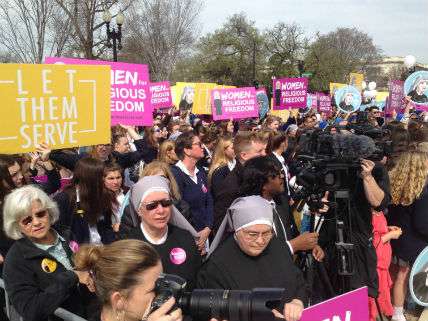Trump Administration May Finally Be Reversing the Birth Control Mandate
A rule is under review that would (reportedly) relax the hotly debated requirement.

Of the many questionable provisions of the Affordable Care Act, the most controversial was undoubtedly the so-called contraception mandate. It has been the subject of two Supreme Court cases already, and if The New York Times is correct, it may spark a third in short order. While the earlier challenges were to the mandate itself, however, this time, the dispute will be over the Trump administration's efforts to do away with it.
The Office of Management and Budget is currently reviewing E.O. 12866, an interim final rule that the Times reports would "roll back" the regulation. This would almost certainly set off yet another legal battle:
Gretchen Borchelt, a vice president of the National Women's Law Center…said her organization was preparing a lawsuit to challenge the expected rule, and she cited several possible legal arguments.
If the Trump administration does not adequately explain and justify the rule, she said, it could be challenged as "arbitrary and capricious," in violation of federal law. In addition, she said, women could challenge it as violating a section of the Affordable Care Act that broadly prohibits discrimination in health programs that receive federal funds.
Ms. Borchelt also pointed to a little-known provision of the Affordable Care Act that says the health secretary shall not issue any rule that "impedes timely access to health care services" or "creates any unreasonable barriers to the ability of individuals to obtain appropriate medical care."
The mandate was created by the Department of Health and Human Services under President Obama, and requires that virtually all employer-provided insurance plans (as well as all plans sold on the Obamacare exchanges) cover all forms of birth control—including those sometimes referred to as abortifacients. Exceptions were made for houses of worship, but not for private businesses or faith-affiliated nonprofits, even though a number of such groups object to participating on moral grounds. The former cohort (the "closely held corporations") won relief with 2014's Hobby Lobby ruling, while the latter brought its challenge before the high court last year in Zubik v. Burwell, better known as the Little Sisters of the Poor case for the order of Catholic nuns who have been party to it.
Earlier this year, Trump's Justice Department shocked many supporters of the president when it declined to drop the case against the Little Sisters and six other religious nonprofits. The outcry was swift, and Trump responded by issuing an executive order that many saw as foreshadowing a rulemaking to reverse the regulation altogether. Now, it appears the president may finally be making good on his repeated campaign-trail promises to ensure that religious groups not be coerced into doing something they view as sinful.
It's about time.
Ideally, the Department of Health and Human Services will eliminate the contraception mandate rather than just exempting a certain category of organizations from it. Better still would be for Congress and the administration to work together to liberate Americans from the long list of supposedly essential health benefits that the Affordable Care Act deemed us categorically too stupid to choose from among ourselves, thus forcing people to pay for coverage they may not want or even be physiologically capable of using.
Alas, that sort of freedom-maximizing outcome continues to seem unlikely.


Show Comments (111)